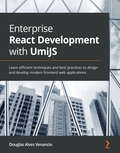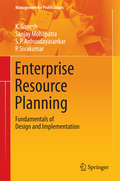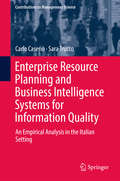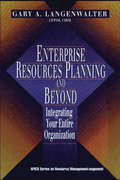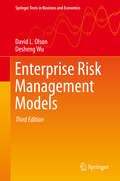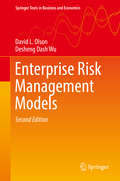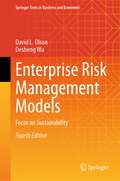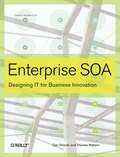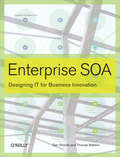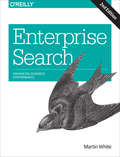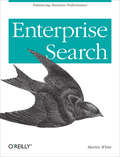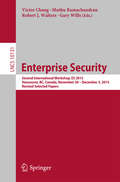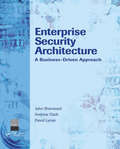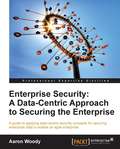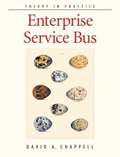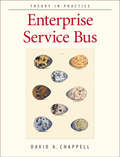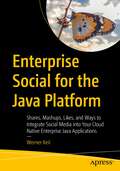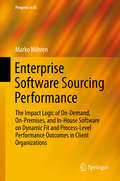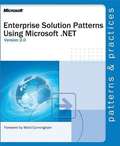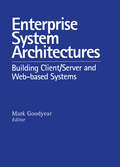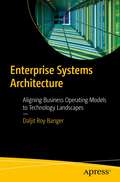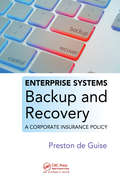- Table View
- List View
Enterprise Rails
by Dan ChakWhat does it take to develop an enterprise application with Rails? Enterprise Rails introduces several time-tested software engineering principles to prepare you for the challenge of building a high-performance, scalable website with global reach. You'll learn how to design a solid architecture that ties the many parts of an enterprise website together, including the database, your servers and clients, and other services as well. Many Rails developers think that planning for scale is unnecessary. But there's nothing worse than an application that fails because it can't handle sudden success. Throughout this book, you'll work on an example enterprise project to learn first-hand what's involved in architecting serious web applications. With this book, you will: Tour an ideal enterprise systems layout: how Rails fits in, and which elements don't rely on Rails Learn to structure a Rails 2.0 application for complex websites Discover how plugins can support reusable code and improve application clarity Build a solid data model -- a fortress -- that protects your data from corruption Base an ActiveRecord model on a database view, and build support for multiple table inheritance Explore service-oriented architecture and web services with XML-RPC and REST See how caching can be a dependable way to improve performance Building for scale requires more work up front, but you'll have a flexible website that can be extended easily when your needs change. Enterprise Rails teaches you how to architect scalable Rails applications from the ground up. "Enterprise Rails is indispensable for anyone planning to build enterprise web services. It's one thing to get your service off the ground with a framework like Rails, but quite another to construct a system that will hold up at enterprise scale. The secret is to make good architectural choices from the beginning. Chak shows you how to make those choices. Ignore his advice at your peril." -- Hal Abelson, Prof. of Computer Science and Engineering, MIT
Enterprise React Development with UmiJS: Learn efficient techniques and best practices to design and develop modern frontend web applications
by Douglas Alves VenancioGet to grips with UmiJS and build professional web applications with the help of step-by-step explanations and hands-on examplesKey FeaturesExplore tips, tricks, and best practices for creating web applications with UmiJSLearn how to apply Ant Design System in UmiJS to build modern user interfacesManage errors in designing web applications while using UmiJS and its main pluginsBook DescriptionUmiJS is the Ant Group's underlying frontend development framework, an open source project for developing enterprise-class frontend applications. In this book, you'll get hands-on with single-page application development using UmiJS. By following practical step-by-step examples, you'll develop essential skills to build and publish your apps and create a modern user experience with responsive interfaces. This book will help you learn the essential features of UmiJS and how to set up and build a project from scratch using React, Less, and TypeScript. You'll study Ant Design, a framework based on solid design concepts that provides a series of React components to accelerate interface development. Along the way, you'll see how to make requests and develop the frontend using simulated data while ensuring that your app has a high level of security and feedback. You'll also discover ways to improve your code quality and readability using formatting tools. By the end of the book, you'll have learned how to use UmiJS to design user interfaces, as well as compile, test, and package your app locally, and deliver your app by deploying it to online services.What you will learnUnderstand how to improve code quality with formatting toolsSecure your application and handle errors in HTTP requests using UmiJSConfigure and use UmiJS for rapid single-page application developmentApply what you've learned when building your portfolio and stand out in the marketUse the visual option Umi UI to build and add components to the projectAdvance as a frontend developer by learning UmiJS best practices and techniques for web application developmentIdentify errors in advance by writing unit tests using Jest and PuppeteerWho this book is forThis book is for React developers who want to develop enterprise-class frontend applications using UmiJS and its main plugins. Basic knowledge of React and JavaScript is assumed but no knowledge of UmiJS is needed.
Enterprise Resource Planning
by Sanjay Mohapatra K. Ganesh S. P. Anbuudayasankar P. SivakumarThis book introduces the fundamental principles of understanding business requirements to apply enterprise resource planning (ERP) in order to meet business needs. The book also helps readers understand the usage of ERP for monitoring and controlling business processes, while providing practical oriented solutions to the design and implementation of ERP. Using the provided framework, a business can decide to provide more value at lower cost which increases its competitive advantage. This should be an ideal reference for executives, researchers and consultants in project management of ERP. ERP can be considered to be an integrated package of business process. The scope of ERP determines the extent of automation of business process. For example if ERP covers Human Resource (HR) and finance business processes only, then business process related HR and finance are automated. Typically business process that are automated in HR and finance employee entry and exist process, allocation of employee ID, payroll, processing , income tax planning and actual deduction etc. There is seamless flow of employee data and information is available at an effectively faster rate to take appropriate decision. As custom demand increases, there is a need to meet the changing scenario with speed and efficiency. While there is a need to increase productivity, there is also a need to reduce cost of operation. The repetitive business processes can be handled effectively by automating them and freeing human resources for meeting other uncertainties. These automations not only should be done for each department, but also should cut across different departments. Thus there is a need for automating business processes at enterprise level. This enterprise level automation started with MRP, then MRP II, ERP and then finally open source ERP have taken centre stage. Out of the standard products available in the market, an organization can chose an ERP product for implementation, depending on the features available and the total cost of ownership (TCO). This comparison helps an organization to choose the product that best suits the needs for the organization. Enterprise Resource Planning: Fundamentals of Design and Implementation highlights these concepts while discusses different good practices to design and implement ERP.
Enterprise Resource Planning and Business Intelligence Systems for Information Quality: An Empirical Analysis in the Italian Setting (Contributions To Management Science)
by Sara Trucco Carlo CaserioThis book analyses the role of Enterprise Resource Planning (ERP) and Business Intelligence (BI) systems in improving information quality through an empirical analysis carried out in Italy. The study begins with a detailed examination of ERP features that highlights the advantages and disadvantages of ERP adoption. Critical success factors for ERP implementation and post-implementation are then discussed, along with the capabilities of ERP in driving the alignment between management accounting and financial accounting information.The study goes on to illustrate the features of BI systems and to summarize companies’ needs for BI. Critical success factors for BI implementation are then presented, along with the BI maturity model and lifecycle. The focus of the research entails a detailed empirical analysis in the Italian setting designed to investigate the role played by ERP and BI systems in reducing information overload/underload and improving information quality by influencing the features of information flow. The practical and theoretical implications of the study are discussed and future avenues of research are suggested. This book will be of value for all those who have an interest in the capacities of ERP and BI systems to enhance business information quality.
Enterprise Resource Planning and Supply Chain Management: Functions, Business Processes and Software for Manufacturing Companies
by Karl Eugen KurbelThis book is about running modern industrial enterprises with the help of information systems. Enterprise resource planning (ERP) is the core of business information processing. An ERP system is the backbone of most companies' information systems landscape. All major business processes are handled with the help of this system. Supply chain management (SCM) looks beyond the individual company, taking into account that enterprises are increasingly concentrating on their core competencies, leaving other activities to suppliers. With the growing dependency on the partners, effective supply chains have become as important for a company's success as efficient in-house processes. This book covers typical business processes and shows how these processes are implemented. Examples are presented using the leading systems on the market - SAP ERP and SAP SCM. In this way, the reader can understand how business processes are actually carried out "in the real world".
Enterprise Resources Planning and Beyond: Integrating Your Entire Organization (Resource Management)
by Gary A LangenwalterTo achieve success in today's business climate you must do more than provide high quality low cost products to customers when and how they want them. Customers and suppliers require fully integrated information - throughout the supply chain or value chain. You must integrate your organization so completely that executive decisions are implemented effortlessly.Competitive pressures often cause a reduction in prices, in spite of continually rising costs. A decrease in prices paired with increased costs quickly eliminates any profitability and threatens your company's ability to survive. This book shows you how you can reduce costs through the elimination of waste caused by poor communication and coordination throughout a company as well as between the company, its suppliers, and its customers.The author explains Enterprise Resource Planning (ERP) in non-technical terms, describing how an ERP system can fully integrate all functions in your manufacturing organization. He demonstrates the system's capability to increase efficiency and profitability - and to delight the customer - as well as its current deficiencies.In addition to his thorough coverage of ERP, the author introduces Total Enterprise Integration (TEI), the process of integrating all the information required to fully support a manufacturing company. TEI represents a logical extension of complete information integration throughout a manufacturing enterprise and into the supply chain. This new concept shows you how the intelligent use of work flow allows responsibility to go to the most appropriate front-line decision makers while maintaining proper budgetary and operational controls. The power of TEI is in the integration of communication across the entire manufacturing company, and out through the supply chain to customers and suppliers. Enterprise Resource Planning and Beyond: Integrating Your Entire Organization focuses on what a fully integrated system can do for you.Features
Enterprise Risk Management Models (Springer Texts in Business and Economics)
by David L. Olson Desheng WuThis book offers a comprehensive guide to several aspects of risk, including information systems, disaster management, supply chain and disaster management perspectives. A major portion of the book is devoted to presenting a number of operations research models that have been (or could be) applied to enterprise supply risk management, especially from the supply chain perspective. Each chapter of this book can be used as a stand-alone module on a respective topic, with dedicated examples, definitions and discussion notes. This book comes at a time when the world is increasingly challenged by different forms of risk and how to manage them. Events of the 21st Century have made enterprise risk management even more critical. Risks such as suspicions surrounding top-management structures, financial and technology bubbles (especially since 2008), as well as the risk posed by terrorism, such as the 9/11 attacks in the U.S. as well as more recent events in France, Belgium, and other European countries, have a tremendous impact on many facets of business. Businesses, in fact, exist to cope with risk in their area of specialization.
Enterprise Risk Management Models (Springer Texts in Business and Economics)
by David L. Olson Desheng Dash WuThis book is a comprehensive guide to several aspects of risk, including information systems, disaster management, supply chain and disaster management perspectives. A major portion of this book is devoted to presenting a number of operations research models that have been (or could be) applied to enterprise supply risk management, especially from the supply chain perspective. Each chapter of this book can be used as a unique module on a different topics with dedicated examples, definitions and discussion notes.This book comes at a time when the world is increasingly challenged by different forms of risk and how to manage them. Events of the 21st Century have made enterprise risk management even more critical. Risks such as suspicions surrounding top-management structures, financial and technology bubbles (especially since 2008), as well as the demonstrated risk from terrorism, such as the 9/11 attack in the U.S. as well as more recent events in France, Belgium, and other locations in Europe, have a tremendous impact on many facets of business. Businesses, in fact, exist to cope with risk in their area of specialization.
Enterprise Risk Management Models: Focus on Sustainability (Springer Texts in Business and Economics)
by David L. Olson Desheng WuThis textbook, now in its fourth edition, serves as a comprehensive guide to learning various aspects of risk, encompassing supply chain management, artificial intelligence, and sustainability. It demonstrates a wide range of operations research models that have been successfully applied to enterprise supply chain risk management. Each chapter of the book can function as a standalone module focusing on a specific topic, offering dedicated examples, definitions, and discussion notes.The publication of this book comes at a crucial time when the world is facing increasing challenges from various forms of risk. Events such as Covid-19, the energy crisis, wars, and terrorism in the 21st century have all disrupted supply chains, thus highlighting the critical importance of enterprise risk management. Additional risks, such as financial and technological bubbles, along with concerns surrounding rampant artificial intelligence, contribute to a climate that demands enhanced risk management within organizations.
Enterprise SOA: Designing IT for Business Innovation
by Dan Woods Thomas MatternInformation Technology professionals can use this book to move beyond the excitement of web services and service oriented architecture (SOA) and begin the process of finding actionable ideas to innovate and create business value. In Enterprise SOA: Designing IT for Business Innovation , SAP's blueprint for putting SOA to work is analyzed from top to bottom. In addition to design, development, and architecture, vital contextual issues such as governance, security, change management, and culture are also explored. This comprehensive perspective reduces risk as IT departments implement ESA, a sound, flexible architecture for adapting business processes in response to changing market conditions. This book answers the following questions: What forces created the need for Enterprise Services Architecture? How does ESA enable business process innovation? How is model-driven development used at all levels of design, configuration, and deployment? How do all the layers of technology that support ESA work together? How will composite applications extend business process automation? How does ESA create new models for IT governance? How can companies manage disruptive change? How can enterprise services be discovered and designed? How will the process of adapting applications be simplified? Based on extensive research with experts from the German software company SAP, this definitive book is ideal for architects, developers, and other IT professionals who want to understand the technology and business relevance of ESA in a detailed way-especially those who want to move on the technology now, rather than in the next year or two.
Enterprise SOA: Designing IT for Business Innovation
by Dan Woods Thomas MatternInformation Technology professionals can use this book to move beyond the excitement of web services and service oriented architecture (SOA) and begin the process of finding actionable ideas to innovate and create business value. In Enterprise SOA: Designing IT for Business Innovation, SAP's blueprint for putting SOA to work is analyzed from top to bottom. In addition to design, development, and architecture, vital contextual issues such as governance, security, change management, and culture are also explored. This comprehensive perspective reduces risk as IT departments implement ESA, a sound, flexible architecture for adapting business processes in response to changing market conditions. This book answers the following questions: What forces created the need for Enterprise Services Architecture?How does ESA enable business process innovation?How is model-driven development used at all levels of design, configuration, and deployment?How do all the layers of technology that support ESA work together?How will composite applications extend business process automation?How does ESA create new models for IT governance?How can companies manage disruptive change?How can enterprise services be discovered and designed?How will the process of adapting applications be simplified?Based on extensive research with experts from the German software company SAP, this definitive book is ideal for architects, developers, and other IT professionals who want to understand the technology and business relevance of ESA in a detailed way--especially those who want to move on the technology now, rather than in the next year or two.
Enterprise Search
by Martin WhiteIs your organization rapidly accumulating more information than you know how to manage? This book helps you create an enterprise search solution based on more than just technology. Author Martin White shows you how to plan and implement a managed search environment that meets the needs of your business and your employees. Learn why it's vital to have a dedicated staff manage your search technology and support your users. In one survey, 93% of executives said their organization is losing revenue because they're not fully able to use the information they collect. With this book, business managers, IT managers, and information professionals can maximize the value of corporate information and data assets. Use 12 critical factors to gauge your organization's search needs Learn how to make a business case for search Research your user requirements and evaluate your current search solution Create a support team with technical skills and organizational knowledge to manage your solution Set quality guidelines for organizational content and metadata Get an overview of open source and commercial search technology Choose an application based on your requirements, not for its features Make mobile and location-independent search part of your solution
Enterprise Search: Enhancing Business Performance
by Martin WhiteIs your organization rapidly accumulating more information than you know how to manage? This updated edition of Enterprise Search helps you create an enterprise search solution based on more than just technology. Author Martin White shows you how to plan and implement a managed search environment that meets the needs of your business and your employees. You'll learn why it’s absolutely vital to have a dedicated staff manage your search technology and support your users.New material for this second edition includes material on SharePoint 2013 search, managing open source search development, website search, designing the search user, and assessing search performance. Chapters now include a Further Reading section for computer science and information science students.Topics include:10 critical success factors to assess organizational search maturityEssential skills needed to support a successful search applicationHow to specify and manage open source search developmentHow to manage SharePoint 2013 searchMethods to assess the business impact of searchBest practices in user interface designThe importance of search for websitesWhat to include in a search strategy
Enterprise Search: Enhancing Business Performance
by Martin WhiteIs your organization rapidly accumulating more information than you know how to manage? This book helps you create an enterprise search solution based on more than just technology. Author Martin White shows you how to plan and implement a managed search environment that meets the needs of your business and your employees. Learn why it’s vital to have a dedicated staff manage your search technology and support your users.In one survey, 93% of executives said their organization is losing revenue because they’re not fully able to use the information they collect. With this book, business managers, IT managers, and information professionals can maximize the value of corporate information and data assets.Use 12 critical factors to gauge your organization’s search needsLearn how to make a business case for searchResearch your user requirements and evaluate your current search solutionCreate a support team with technical skills and organizational knowledge to manage your solutionSet quality guidelines for organizational content and metadataGet an overview of open source and commercial search technologyChoose an application based on your requirements, not for its featuresMake mobile and location-independent search part of your solution
Enterprise Security
by Gary Wills Muthu Ramachandran Victor Chang Robert J. WaltersEnterprise security is an important area since all types of organizations require secure and robust environments, platforms and services to work with people, data and computing applications. The book provides selected papers of the Second International Workshop on Enterprise Security held in Vancouver, Canada, November 30-December 3, 2016 in conjunction with CloudCom 2015. The 11 papers were selected from 24 submissions and provide a comprehensive research into various areas of enterprise security such as protection of data, privacy and rights, data ownership, trust, unauthorized access and big data ownership, studies and analysis to reduce risks imposed by data leakage, hacking and challenges of Cloud forensics.
Enterprise Security Architecture: A Business-Driven Approach
by Nicholas SherwoodSecurity is too important to be left in the hands of just one department or employee-it's a concern of an entire enterprise. Enterprise Security Architecture shows that having a comprehensive plan requires more than the purchase of security software-it requires a framework for developing and maintaining a system that is proactive. The book is based
Enterprise Security: A Data-Centric Approach to Securing the Enterprise
by Aaron WoodyIt's a reference guide to enterprise security programs. This book is intended for the IT security staff beginner to expert but would also be a valuable resource for other IT functions such as IT compliance, IT operations, and executives responsible for managing IT and information security. Understanding the principles in this book is important for decision makers as new business models are developed and enterprise security must keep up to reduce risk and secure critical enterprise assets and data.
Enterprise Service Bus
by Dave ChappellEnterprise Service Bus provides an architectural overview of the ESB, showing how it can bring the task of integration of enterprise applications and services built on J2EE, .NET, C/C++, and other legacy environments into the reach of the everyday IT professional, using an event-driven Service-Oriented Architecture. Through the study of real-world use cases drawn from several industries using ESB, the book clearly and coherently outlines the benefits of moving toward this integration strategy.
Enterprise Service Bus: Theory in Practice
by David A ChappellLarge IT organizations increasingly face the challenge of integrating various web services, applications, and other technologies into a single network. The solution to finding a meaningful large-scale architecture that is capable of spanning a global enterprise appears to have been met in ESB, or Enterprise Service Bus. Rather than conform to the hub-and-spoke architecture of traditional enterprise application integration products, ESB provides a highly distributed approach to integration, with unique capabilities that allow individual departments or business units to build out their integration projects in incremental, digestible chunks, maintaining their own local control and autonomy, while still being able to connect together each integration project into a larger, more global integration fabric, or grid.Enterprise Service Bus offers a thorough introduction and overview for systems architects, system integrators, technical project leads, and CTO/CIO level managers who need to understand, assess, and evaluate this new approach. Written by Dave Chappell, one of the best known and authoritative voices in the field of enterprise middleware and standards-based integration, the book drills down into the technical details of the major components of ESB, showing how it can utilize an event-driven SOA to bring a variety of enterprise applications and services built on J2EE, .NET, C/C++, and other legacy environments into the reach of the everyday IT professional.With Enterprise Service Bus, readers become well versed in the problems faced by IT organizations today, gaining an understanding of how current technology deficiencies impact business issues. Through the study of real-world use cases and integration patterns drawn from several industries using ESB--including Telcos, financial services, retail, B2B exchanges, energy, manufacturing, and more--the book clearly and coherently outlines the benefits of moving toward this integration strategy. The book also compares ESB to other integration architectures, contrasting their inherent strengths and limitations.If you are charged with understanding, assessing, or implementing an integration architecture, Enterprise Service Bus will provide the straightforward information you need to draw your conclusions about this important disruptive technology.
Enterprise Social for the Java Platform: Shares, Mashups, Likes, and Ways to Integrate Social Media into Your Cloud Native Enterprise Java Applications
by Werner KeilLearn everything you need to know about frameworks that help developers to integrate their solutions with social networks or APIs, from general purpose (Facebook, Twitter, Google, Mastodon) to specialized (LinkedIn, Xing, WhatsApp, YouTube, Instagram, Flickr, TikTok) to vertical (eToro, Fitbit, Strava). This book will teach you how to add social media features to web applications or services developed using Java, Jakarta EE, or generally running on a Java Virtual Machine (JVM). Jam-packed with practical examples of social integration into enterprise applications, you’ll learn how to address common requirements such as social login, identity federation, single sign-on via social accounts, OpenID Connect, and mashups. You’ll also see how to leverage Java social frameworks like Facebook Business SDK, Twitter4J, Agorava, Keycloak, and Spring Security. Enterprise Social for the Java Platform is an excellent companion to books covering Jakarta EE Security, Spring Security, portals, and related frameworks. Upon completing it, you’ll be armed with the expertise you need to integrate your own Java enterprise applications with social media networks. What You Will Learn Harness the reach and power of social media platforms by integrating your enterprise Java applications with themUnderstand social media standards for different platformsAddress common security issues Who This Book Is For Developers, architects, and managers of projects involving the use of APIs or Social Networks.
Enterprise Software Sourcing Performance
by Marko NöhrenThis book opens the "black box" of software sourcing by explaining how dynamic software alignment is established and how it impacts business performance outcomes. By investigating how software-sourcing modes are related to value generation in the post-implementation phase, it shows researchers and managers the impact logic of on-demand, on-premises, and in-house software on dynamic fit and process-level performance outcomes in a client organization. It describes dynamic IT alignment as the key to success in a fast-moving digital world with software-as-a-service on the rise and highlights the fact that today companies can choose between developing software in-house (make) or sourcing packaged systems in an on-premises (buy) or an on-demand (lease) mode. This book is the first to explicitly compare these sourcing arrangements with each other in terms of alignment and business performance.
Enterprise Solution Patterns Using Microsoft® .NET
by Microsoft CorporationGet expert guidance on patterns--simple, proven mechanisms by which software professionals can share important architectural tradeoffs and design decisions--and help reduce the complexity of building high-performance, enterprise-class business solutions. Focusing on architectural, design, and implementation patterns for Microsoft .NET, this guide captures the knowledge of seasoned developers and shares their time-tested patterns and best practices. Developers and architects learn how to use individual patterns for specific technical scenarios, as well as how to combine patterns to build more complex solutions. All PATTERNS & PRACTICES guides are reviewed and approved by Microsoft engineering teams, consultants, partners, and customers--delivering accurate, real-world information that's been technically validated and tested.
Enterprise System Architectures: Building Client Server and Web Based Systems
by Michael C. Davis Mark Goodyear Hugh W. Ryan Scott R. Sargent Stanton J. Taylor Timothy M. Boudreau Yannis S. Arvanitis Richard A. Chang John K. Kaltenmark Nancy K. Mullen Shari L. Dove John C. Clark Craig MindrumExperts from Andersen Consulting show you how to combine computing, communications, and knowledge to deliver a uniquely new-and entirely indispensable-competitive advantage.Lead, Follow, or get out of the wayYour company's ability to sustain a competitive advantage is in jeopardy. Your competitors can imitate and improve faster than ever. You need to find ways to help your company discover and deliver and astounding solution, control its costs, and move on the next astounding solution.Web-based computing is the vital technology enabler for today's most important business opportunities, like E-Commerce. It is also the flexible foundation for future solutions. However, because of the complexities and difficulties it represents, it can be critical hurdle for IT shops and for an entire business. Enterprise Systems Architecture: Building Client/Server and Web-Based Systems is your guide through these complexities as you integrate your technology capabilities with your strategy, people, and processes to deliver astounding solutions. It Introduces you to basic principles and concepts, provides an overview of state-of-the-art in client/server and Web-based computing models, and develops a solid business case for implementation.Acquaints you with various technologies involved and describes a comprehensive network computing architecture.Details crucial analysis, design, and implementation issues, including design specifics for architectures, applications, and network; rollout strategies; and ongoing management of distributed operations. Explores emerging technologies and their likely impact on the future of netcentric computing.Here you'll find detailed information on the architectures and frameworks for network-based computing � strategies for designing and implementing solutions � strategies and methods for security. It also provides a full framework for testing applications, and in-depth dis
Enterprise Systems Architecture: Aligning Business Operating Models to Technology Landscapes
by Daljit Roy BangerEnhance your technical and business skills to better manage your organization’s technology ecosystem. This book aims to explain how to align the technology landscape to service your company’s business operating model. The book begins by exploring different architectural approaches before taking a deep dive into multiple layers of the architectural stack and the methodology of each component. You’ll also learn about the many products delivered by enterprise architecture. To complete the book, author Daljit Banger delves into the various roles and responsibilities of an enterprise architect. After completing Enterprise Systems Architecture, you will understand how to develop an ICT (Information Communication Technology) strategy to meet the needs of your organization. What Will You Learn Gain a complete understanding of enterprise architectureConceptualize the enterprise ecosystem using the EsA canvasMaster the products and services of an enterprise architecture function Who This Book Is For Architects (Enterprise, Solution, or Technical), CTOs, Business Analysts, or any stakeholder in delivering technology services to their organization.
Enterprise Systems Backup and Recovery: A Corporate Insurance Policy
by Preston de GuiseThe success of information backup systems does not rest on IT administrators alone. Rather, a well-designed backup system comes about only when several key factors coalesce-business involvement, IT acceptance, best practice designs, enterprise software, and reliable hardware. Enterprise Systems Backup and Recovery: A Corporate Insurance Policy prov

